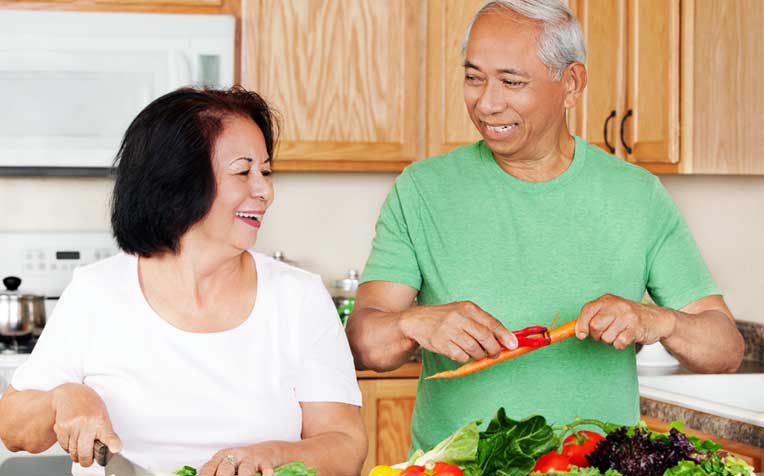
Protein doesn't just mean meat. There are affordable and easy-to-find alternatives available. Read on to find out what they are.
In Singapore, there's a diverse array of alternative protein sources readily available, offering seniors nutritious options to support their health.
In our rapidly aging population, ensuring seniors have access to adequate nutrition is crucial for their overall well-being. Protein plays a vital role in supporting muscle health, bone health, immune function, and overall vitality.
Daily recommended amount of protein for adults
How much protein a person should consume daily is dependent on age. Health Promotion Board (HPB) recommends:
For younger adults under 50 years of age, aim for 60g of protein daily (about 20g per meal)
For older adults aged 50 years and over, aim for 75g of protein daily (about 25g per meal).
Seniors need adequate protein to maintain muscle mass, prevent frailty and support recovery from illness or injury. However, traditional protein sources like meat and dairy may not always be accessible or suitable for everyone.
Fortunately for you, our experts from the Department of Dietetics, Changi General Hospital (CGH), a member of the SingHealth group, are here to provide some alternatives!
6 Protein sources easily found
Tofu and Tempeh
/tempeh.jpg)
Found in traditional markets and supermarkets across Singapore, tofu and tempeh are staples in local cuisine. Tofu, made from soybeans, is versatile and can incorporated into soups, salads, and stir-fries. Tempeh, with its nutty flavor, is often used in dishes such as sambal goreng (dish consisting of stir-fried tofu, tempeh and long beans) and rendang, offering seniors a familiar and nutritious protein source.Lentils and beans
/baked-beans.jpg)
Lentils and beans are readily available in supermarkets and health food stores. They can be incorporated into dishes like dal, soups, and salads, providing seniors with a nutritious and hearty meal option. For an easy fix, visit the nearest coffee shop serving Western food for a side order of baked beans.Edamame
/edamame.jpg)
Widely enjoyed as a snack or appetizer in Singapore, edamame is readily available in frozen form in supermarkets and Japanese specialty stores. Seniors can enjoy boiled edamame or incorporate them into dishes like fried rice and salads, adding a nutritious boost of plant-based protein to their diet.Tofu Puffs (Tau Pok)
/tau-pok.jpg)
This is a popular ingredient in stews or braised dishes. Tofu puffs are deep-fried tofu cubes that absorb the flavours of the dishes they are cooked in. They can also be stuffed with minced meat or vegetables, offering seniors a delicious and protein-rich option for meals.Soy-based products

Singapore boasts a wide range of soy-based products such as soy milk, soy yogurt, and soy-based meat substitutes. These products are available in supermarkets and health food stores, providing seniors with convenient options to incorporate plant-based protein into their diet.
Nuts and seeds
/nuts-and-seeds.jpg)
Nuts and seeds like peanuts, almonds, and sesame seeds are commonly used in Singaporean cuisine. They can be sprinkled on dishes like salads and noodles, used as toppings for desserts, or enjoyed as a snack, offering seniors a source of protein, healthy fats, and essential nutrients.
Easy ways to incorporate alternative proteins into your daily diet
Eat some traditional dishes
Encourage seniors to enjoy traditional Singaporean dishes that incorporate alternative protein sources such as tofu, tempeh, and tofu puffs. Some commonly found examples are Yong Tau Foo (with stuffed tofu), hotplate tofu, stir fry tofu or braised tofu dishes. Tofu can be a side dish when ordering a plate of ayam penyet or economy rice.
Healthy snacking
Encourage seniors to snack on edamame, nuts, and seeds throughout the day to boost their protein intake and satisfy hunger cravings. These are much healthier alternatives to other snacks like potato chips or sweet pastries.
Recipe adaptations
Modify recipes to incorporate alternative protein sources. For example, replace meat with tofu or tempeh in stir-fries and curries.
Nutrient-dense smoothies
Blend tofu, lentils, or nut butter into smoothies with fruits and vegetables to create a nutrient-packed beverage for seniors.
Seniors in Singapore
According to the Department of Statistics Singapore, the proportion of residents aged 65 years and over is projected to increase to 25% by 2030.
With the aging population, addressing nutritional needs becomes paramount, making the exploration of alternative protein sources essential for promoting healthy aging in Singapore.
Rise of alternative protein sources
As awareness grows about sustainability, health, and ethical concerns surrounding traditional animal-based proteins, the demand for alternative protein sources is on the rise. In Singapore, where space and resources are limited, alternative proteins offer a sustainable solution to meet the dietary needs of seniors while minimizing environmental impact.
By embracing alternative protein sources commonly found in Singapore, seniors can enjoy delicious and nutritious meals that support their health and well-being. From tofu and tempeh to lentils, beans, and nuts, these protein alternatives offer seniors a diverse range of options to meet their dietary needs while enjoying the flavours of local cuisine. By incorporating these protein-rich foods into their diet, seniors can maintain their health and vitality as they age, contributing to a vibrant and active community in Singapore.
In summary, seniors should aim for a healthy and balanced diet that includes a variety of protein sources which aligns with their individual needs and food preferences. Remember to consult a healthcare professional or a registered dietitian to create a personalised nutrition plan. |
Ref: H24
Related articles:
How Much Protein Do Seniors Need?
Nutrition and Diet Tips for Seniors

















 Get it on Google Play
Get it on Google Play